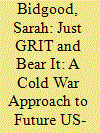|
|
|
Sort Order |
|
|
|
Items / Page
|
|
|
|
|
|
|
| Srl | Item |
| 1 |
ID:
179374


|
|
|
|
|
| Summary/Abstract |
Even at the height of the Cold War, Washington and Moscow found ways to cooperate on nuclear issues. But what brought the two rivals to the negotiating table in the first place? History points to Graduated Reciprocation in Tension-reduction (GRIT), an approach employed by President John F. Kennedy and, later, George H. W. Bush to cut through enemy images and move arms control forward. Today, GRIT could offer a path out of the US-Russia security dilemma towards renewed nuclear engagement. GRIT’s emphasis on self-restraint aligns with cuts to military budgets that will follow from the pandemic. Its use of unilateral, reciprocal steps, meanwhile, could open doors to asymmetric and multilateral arms control modalities.
|
|
|
|
|
|
|
|
|
|
|
|
|
|
|
|
| 2 |
ID:
169461


|
|
|
|
|
| Summary/Abstract |
Despite living in a nuclear-weapon state, young Americans are generally ill-informed about weapons of mass destruction (WMD) and their means of control. The result is both widespread apathy toward nonproliferation and disarmament decision making among the general public and a looming personnel crisis within government sectors that enact policy in these domains. Considering that 67 percent of high school graduates in the United States go on to pursue a bachelor’s degree, exposing more undergraduates to nonproliferation and disarmament issues could contribute to addressing both of these challenges. The present study analyzes how these issues are already being taught at select US colleges and universities and explores ways to introduce them to more students that align with current priorities in higher education, such as interdisciplinary learning, digital humanities, and data-science learning. It also proposes concrete steps that the WMD policy community can take to help institutions of higher education integrate these topics more broadly into their curricula. The anticipated result is greater support for education in this important issue area across different stakeholders in academia, as well as increased engagement with these critical issues among a more diverse population of young people.
|
|
|
|
|
|
|
|
|
|
|
|
|
|
|
|
| 3 |
ID:
162685


|
|
|
|
|
| Summary/Abstract |
Relations between the United States and Russia are in a prolonged downward spiral. Under these circumstances, cooperation on nuclear issues—once a reliable area of engagement even in difficult political environments—has all but completely halted. There are urgent reasons to find a way out of this situation, particularly the expiration of the New Strategic Arms Reduction Treaty in 2021. However, seemingly intractable disagreements about noncompliance with the Intermediate-range Nuclear Forces Treaty and US ballistic-missile defense, compounded by the Ukraine crisis, the conflict in Syria, and the accusations of Russian interference in the US election of 2016, threaten the future of arms control. Against this backdrop, policy makers and practitioners should identify ways to re-engage on nuclear issues now so they can be ready to implement them as soon as feasible. This article considers how the Comprehensive Nuclear-Test-Ban Treaty (CTBT) could serve as a platform for US–Russia cooperation on nuclear issues when circumstances permit. Taking into account the challenges posed by ongoing US non-ratification, it identifies a menu of CTBT-related activities short of ratification that the two countries could undertake together. It explores how joint work on this issue would advance shared US and Russian interests while helping to create the circumstances necessary for further arms-control work.
|
|
|
|
|
|
|
|
|
|
|
|
|
|
|
|
|
|
|
|
|